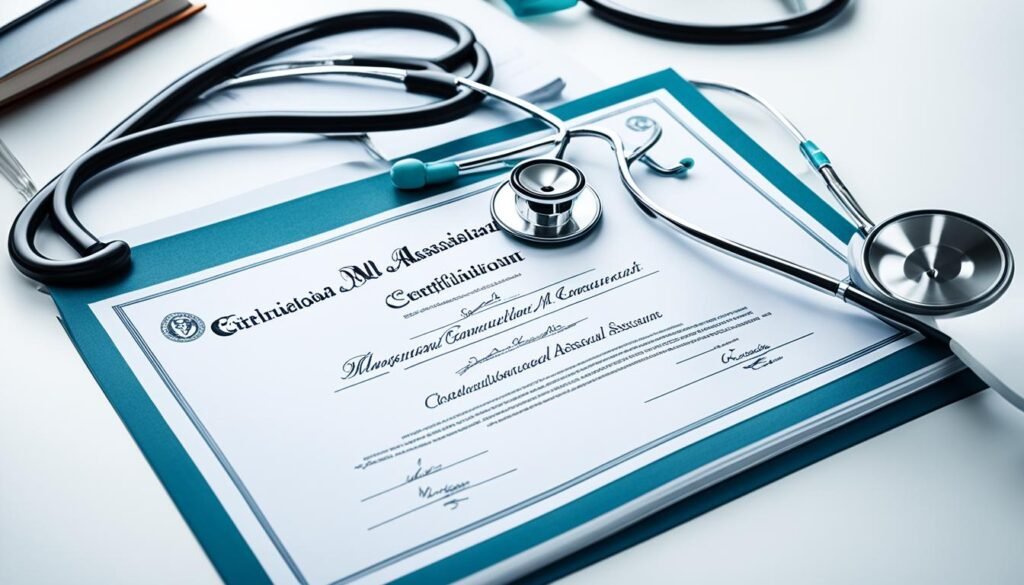Become A Medical Assistant can be a fulfilling career choice with an increased demand for these versatile professionals. Medical assistants play an important part in the healthcare delivery system and have a diverse array of responsibilities. While the laws governing medical assistants can vary from state to state, in New Jersey, for example, a high school diploma or GED is the minimum requirement to work as a medical assistant. However, many employers prefer candidates who have completed a medical assisting program and hold a certification. A quality education through a certificate or associate degree program is often the foundation for a successful career as a medical assistant.
Key Takeaways: Become A Medical Assistant
- Becoming a medical assistant can lead to a fulfilling and in-demand career in the healthcare field.
- In New Jersey, a high school diploma or GED is the minimum requirement, but many employers prefer candidates with a medical assisting program and certification.
- A quality education through a certificate or associate degree program can provide a strong foundation for a successful career as a medical assistant.
- Medical assistants have a wide range of job duties, encompassing both clinical and administrative tasks.
- The demand for medical assistants is expected to increase as the healthcare industry expands.
Job Duties of a Medical Assistant
Medical assistants play a vital role in healthcare settings, performing a wide range of clinical and administrative tasks. They are responsible for ensuring the smooth functioning of medical offices and supporting healthcare providers in delivering quality care to patients.
Clinical Duties
Medical assistants work directly with patients, taking vital signs, such as blood pressure and temperature, and recording medical histories. They also assist physicians during examinations and procedures, preparing the necessary instruments and ensuring patient comfort. Additionally, medical assistants may be trained to administer medications, although certification is required in some states. They perform simple laboratory tests, collect and prepare lab specimens, and properly dispose of biohazardous materials.
Administrative Duties
Medical assistants handle various administrative tasks to ensure the efficient operation of medical offices. They schedule appointments, manage patient records, and update electronic health records to maintain accurate and up-to-date information. Medical assistants also handle billing and coding procedures, verifying insurance coverage, and submitting claims. They may greet patients, answer phone calls, and handle correspondence, ensuring a professional and friendly atmosphere in the office.
Table: Typical Job Duties of a Medical Assistant
| Clinical Duties | Administrative Duties |
|---|---|
| Taking vital signs | Scheduling appointments |
| Assisting physicians with examinations | Managing patient records |
| Collecting and preparing lab specimens | Updating electronic health records |
| Administering medications (if certified) | Handling billing and coding procedures |
| Performing simple laboratory tests | Verifying insurance coverage |
Medical assistants can work in a variety of healthcare settings, including medical offices, hospitals, and outpatient clinics. Their role may vary depending on the specific healthcare facility and the needs of the healthcare team.
It’s important to note that the salary of medical assistants can vary based on factors such as certification, experience, and geographical location. According to the Bureau of Labor Statistics, the median annual wage for medical assistants in May 2020 was $35,850. However, salaries can range from around $26,270 to $51,040, with the highest wages typically earned by medical assistants working in metropolitan areas or specialized medical fields.
Education and Certification Requirements

While a high school diploma or GED is the minimum requirement to work as a medical assistant, many employers prefer candidates who have completed a medical assisting program and hold a certification.
Graduating from a medical assisting program accredited by organizations such as the Commission on Accreditation of Allied Health Education Programs (CAAHEP) or the Accrediting Bureau of Health Education Schools (ABHES) can make it easier to qualify for medical assisting certifications.
There are several organizations that offer medical assistant certifications, such as the American Association of Medical Assistants (AAMA) and the American Medical Technologists.
Obtaining a certification can enhance employability and increase earning potential as a medical assistant.
Certification Programs for Medical Assistants
Medical assistants can choose from various certification programs to further enhance their skills and qualifications. These programs provide specialized training and knowledge in areas such as medical terminology, medical histories, and administrative duties.
| Certification Program | Organization |
|---|---|
| American Association of Medical Assistants (AAMA) | AAMA |
| American Medical Technologists (AMT) – Certified Medical Assistant (CMA) | AMT |
| National Healthcareer Association (NHA) – Certified Clinical Medical Assistant (CCMA) | NHA |
| National Center for Competency Testing (NCCT) – National Certified Medical Assistant (NCMA) | NCCT |
Medical Assistant Training Programs
To pursue a career as a medical assistant, aspiring professionals can enroll in medical assistant training programs. These programs offer comprehensive education and hands-on training to prepare students for the demands of the role.
Medical assistant training programs cover various subjects, including medical terminology, anatomy and physiology, medical billing and coding, clinical procedures, and administrative tasks.
Here are some well-regarded medical assistant training programs:
- Accredited Medical Assistant Schools
- American Career College – Medical Assistant Program
- Allied Health Schools – Medical Assistant Training Program
- California State University, Long Beach – Medical Assistant Certificate Program
- Master the Medical Assisting Workflow – Online Medical Assistant Training
Completing a medical assistant training program can provide the necessary knowledge and skills to thrive in a medical assisting career.
Advancement and Career Growth
Medical assistants have various opportunities for career advancement in the healthcare field. Whether they choose to further their education or specialize in specific areas, there are paths to explore for professional growth.
Pursuing Higher Education
Some medical assistants opt to complete a degree program in medical assisting or a related field. This further education provides a deeper understanding of healthcare practices and can open doors to advanced roles.
“Earning a degree in medical assisting can equip you with the knowledge and skills necessary for leadership positions in the medical field.” – Dr. Sarah Davis, Medical Education Specialist
Specializing in Administrative or Clinical Roles
Medical assistants may choose to specialize in either administrative or clinical roles. By focusing on specific areas, such as medical office administration or clinical procedures, they can become experts in their chosen field.
Additional Certifications
With experience and additional certifications, medical assistants can become eligible for higher-level positions and take on more responsibilities. There are recognized certifications available for medical assistants who want to specialize in specific areas of practice, such as clinical medical assisting or administrative medical assisting.
Career Advancement Opportunities
By continuously expanding their knowledge and skill set, medical assistants can increase their chances of career advancement. They may qualify for roles such as office managers, healthcare administrators, or trainers in medical assisting programs.
Medical assisting is a dynamic field with ample opportunities for growth and advancement. With dedication and a commitment to ongoing learning, medical assistants can carve out successful careers in the healthcare industry.
Legal Considerations for Medical Assistants

As a medical assistant, understanding the legal considerations that apply to your profession is crucial. The laws and regulations regarding medical assisting can vary from state to state, so it is important to familiarize yourself with the specific regulations in the state where you will be practicing.
One of the first legal considerations is the scope of practice for medical assistants. Each state has its own set of guidelines dictating the specific tasks and responsibilities that medical assistants are allowed to perform. It is essential to be knowledgeable about your scope of practice to ensure that you are operating within the legal boundaries of your role.
Choosing the right medical assistant program is another important consideration. It is crucial to select a reputable and accredited program that provides comprehensive training and education. A quality medical assistant program will not only equip you with the necessary skills and knowledge but will also ensure that you are prepared to meet the legal requirements of your profession.
By staying informed about legal considerations, medical assistants can ensure that they are providing safe and effective care within the parameters of their allowed scope of practice. Additionally, understanding the legal aspects of the profession can help medical assistants navigate their career paths and make informed decisions regarding their practice.
| Legal Considerations for Medical Assistants |
|---|
| Understanding the laws and regulations governing medical assisting in your state |
| Familiarizing yourself with the scope of practice for medical assistants |
| Choosing an accredited medical assistant program to ensure proper training and education |
| Staying informed about legal requirements and updates in the field |
Being aware of the legal considerations and requirements specific to medical assisting will not only protect you professionally but also ensure that you are providing the highest standard of care to patients.
Resources for Medical Assistants

Aspiring and experienced medical assistants have a wealth of resources available to enhance their knowledge and skills. These resources can help medical assistants navigate interviews, gain practical experience, and find employment opportunities in the field.
“Being well-prepared for an interview can give you the confidence you need to land your dream job as a medical assistant.”
Interview Preparation
Preparing for a medical assistant interview is crucial to stand out from other candidates. Utilizing sample interview questions and practicing responses can help you feel more confident and articulate during the actual interview. By effectively highlighting your experience and skills, you can increase your chances of securing a medical assistant position. Some commonly asked interview questions for medical assistants include:
- Describe your experience working as a medical assistant.
- How do you handle challenging situations in a medical office?
- What medical procedures are you experienced in?
- How do you prioritize tasks and manage your time efficiently?
Professional Organizations
Joining professional organizations, such as the American Association of Medical Assistants (AAMA), can provide valuable networking opportunities and access to resources that can aid in your career development. These organizations often offer continuing education courses, webinars, and conferences, allowing you to stay updated on industry trends and advancements in medical assisting.
“Professional organizations can connect you with peers and mentors who can offer guidance and support throughout your career.”
Job Boards and Career Websites
Utilizing job boards and career websites can assist medical assistants in finding employment opportunities and gaining insights into the current job market. These platforms often provide job search strategies, resume-building tips, and interview advice tailored specifically to medical assistants. Some popular job boards and career websites for medical assistants include:
- Indeed
- CareerBuilder
- Monster
| Resource | Description |
|---|---|
| American Association of Medical Assistants (AAMA) | A widely recognized professional organization for medical assistants offering networking opportunities, continuing education resources, and industry updates. |
| Indeed | A popular job board where medical assistants can search for employment opportunities and apply for relevant positions. |
| A professional networking platform that connects medical assistants with potential employers and industry professionals. | |
| CareerBuilder | An online career platform that provides job search tools, resume assistance, and industry insights for medical assistants. |
| Monster | A comprehensive job board with a wide range of medical assistant positions and resources for career development. |
By utilizing these resources, medical assistants can enhance their interview skills, gain valuable experience, and equip themselves with the knowledge and tools necessary to excel in their careers.
Salary and Benefits for Medical Assistants

Medical assistants can expect a competitive salary and comprehensive benefits packages, making it a rewarding career choice. The job outlook for medical assistants is promising, with a projected growth rate higher than the average for all occupations. As the healthcare industry expands and the population ages, there is an increasing demand for medical assistants to perform various tasks in medical settings.
Medical assistants earn a salary that can vary depending on factors such as certification, experience, and geographical location. The median annual wage for medical assistants is $35,850, with top earners making over $50,000 per year. The salary can also be influenced by the type of healthcare facility and the specific responsibilities of the medical assistant.
In addition to a competitive salary, medical assistants often receive comprehensive benefits packages. These packages may include healthcare insurance, paid time off, retirement benefits, and other perks. The specific benefits offered can vary depending on the employer and the medical assistant’s employment status (full-time, part-time, or contract basis).
Many employers prefer to hire certified medical assistants, as certification can validate their skills and knowledge. To become a certified medical assistant, individuals can complete an accredited medical assisting program and pass a certification exam. Certification can enhance employability and increase earning potential.
Online medical assisting programs are also available for those interested in learning to become a medical assistant. These programs provide flexible options for individuals who may have other commitments such as work or family responsibilities. Online programs offer the opportunity to complete coursework at a pace that suits the student’s needs.
| Salary Factors | Impact |
|---|---|
| Certification | Can increase earning potential |
| Experience | Can lead to higher salary offers |
| Geographical Location | Can affect the cost of living and demand for medical assistants |
The table above highlights the factors that can impact a medical assistant’s salary. Certification, experience, and geographical location all play a role in determining earning potential.
The image above illustrates the job outlook for medical assistants, showcasing the promising growth rate in comparison to other occupations. As the demand for medical assistants continues to rise, individuals pursuing a career in this field can expect ample job opportunities and stability.
Continuing Education and Career Development

Continuing education and career development are crucial for medical assistants to stay updated on advancements in the healthcare field. As the field of medicine continues to evolve, it is essential for medical assistants to enhance their skills and knowledge to provide quality care to patients.
Medical assistants may be required to complete continuing education as a condition of employment and to maintain their professional credentials. This ensures that they remain knowledgeable about the latest procedures, medical technologies, and best practices.
One way medical assistants can stay current is by joining professional organizations such as the American Association of Medical Assistants (AAMA). These organizations provide valuable resources, networking opportunities, and access to continuing education courses and conferences. By actively participating in these organizations, medical assistants can broaden their professional network and stay updated on industry trends.
“Continuing education allows medical assistants to expand their skill set and adapt to the changing healthcare landscape.” – John Smith, Certified Medical Assistant
Another useful resource for medical assistants is job descriptions and interview preparation. By reviewing medical assistant job descriptions and interview questions, aspiring medical assistants can gain insight into the skills and qualifications employers are looking for. This information can help them prepare for interviews and highlight their experience and training during the hiring process.
Medical assistants can also take advantage of online platforms and resources that offer self-paced courses and training programs specific to their job roles. These online courses can cover a wide range of topics, from medical terminology to advanced clinical procedures.
Benefits of Continuing Education and Career Development
Continuing education and career development offer numerous benefits to medical assistants:
- Professional Growth: Continuing education allows medical assistants to grow both personally and professionally. It helps them stay current with industry trends, learn new skills, and adapt to changes in healthcare practices.
- Enhanced Job Opportunities: Medical assistants who invest in their professional development often have a competitive advantage when applying for job opportunities. Employers value candidates who demonstrate a commitment to ongoing learning and growth.
- Increased Earning Potential: Medical assistants who pursue additional certifications or specialize in specific areas of practice can potentially earn higher salaries and enjoy more significant career advancement opportunities.
Continuing education and career development are essential for medical assistants to thrive in their profession and provide the best possible care to patients. By staying abreast of advancements in the healthcare field, medical assistants can continue to grow their skills, expand their opportunities, and make a positive impact in patient care.
Opportunities in New York State for Medical Assistants

New York State offers numerous opportunities for medical assistants. With a large and busy healthcare system, including hospitals, private practices, and clinics, there is a high demand for medical assistants in New York. The state has a robust healthcare industry, and the employment numbers for medical assistants in New York are among the highest in the country. Medical assistants in New York may also have the opportunity to take on additional tasks, such as COVID-19 testing, during public health emergencies. The salary for medical assistants in New York is typically higher than the national average.
If you are looking to start your career as a medical assistant, New York State provides a promising job market. The healthcare industry in the state is thriving, and there are ample opportunities for employment and professional growth. Whether you are a recent graduate of a medical assisting program or have previous experience working as a medical assistant, New York offers a range of job openings in various healthcare settings.
Working as a medical assistant in New York State can be rewarding and fulfilling. You will have the chance to work alongside healthcare professionals and make a difference in patient care. As a medical assistant, you will perform both clinical and administrative tasks, ensuring the smooth operation of medical facilities and delivering high-quality healthcare services.
Job Outlook and Salary
The job outlook for medical assistants in New York State is promising, with the demand expected to grow in the coming years. The healthcare industry continues to expand, creating a need for skilled medical assistants to support healthcare providers. As a medical assistant in New York, you can expect a competitive salary, which is typically higher than the national average. The exact salary can vary based on your experience, certifications, and geographical location within the state.
Training and Certification
To get a medical assistant job in New York, it is important to have the necessary education and training. Most employers prefer candidates who have graduated from a medical assisting program and hold certifications, such as the Certified Medical Assistant (CMA) credential from the American Association of Medical Assistants (AAMA). Completing a medical assisting program will equip you with the knowledge and skills needed to excel in your role and provide excellent patient care.
In addition to formal education and certification, having relevant work experience can also enhance your chances of finding work as a medical assistant in New York State. Consider gaining experience through internships, externships, or volunteering in healthcare settings to strengthen your resume and demonstrate your commitment to the profession.
Networking and Professional Development
Networking can play a crucial role in finding work as a medical assistant in New York. Joining professional organizations, attending industry events and conferences, and connecting with healthcare professionals can help you expand your professional network and learn about job opportunities. The American Association of Medical Assistants (AAMA) and other industry-specific organizations can provide valuable resources and support for your career development.
Continuing education is also important for medical assistants in New York State. Staying updated on the latest advancements in medical assisting and healthcare can enhance your skills and open up new career opportunities. Look for continuing education programs, workshops, and online courses that align with your interests and professional goals.
Taking advantage of the opportunities available in New York State can provide a solid foundation for a successful career as a medical assistant. With the state’s thriving healthcare industry and high demand for medical assistants, you can find fulfilling work and contribute to the well-being of patients in the region.
Also Read: Discover the Top 10 Eye Hospitals in Maharashtra
Conclusion
Becoming a medical assistant can provide a rewarding and fulfilling career in the healthcare field. With a variety of job duties, opportunities for career advancement, and a promising job outlook, medical assisting offers stability and growth potential. Whether working in clinical or administrative settings, medical assistants play a crucial role in maintaining efficient healthcare operations and providing quality care to patients.
While the specific requirements and regulations may vary by state, completing an accredited medical assisting program and obtaining recognized medical assisting certification can enhance employability and increase earning potential. These qualifications demonstrate a commitment to professionalism and proficiency in the field.
If you’re interested in a medical assistant career but don’t have a medical assisting program or certification, there are still opportunities available. Medical assistants can work in various healthcare settings, such as hospitals, medical offices, and outpatient clinics. While certification may not be required for some positions, pursuing an accredited medical assisting program can provide a solid foundation of knowledge and skills.
Recognized medical assisting certifications, such as those offered by the American Association of Medical Assistants, can help you stand out from the competition and open up additional career opportunities. Whether you choose to pursue immediate employment or further your education, the medical assistant field offers a dynamic and rewarding path.
FAQs
Q: What are the steps to become a certified medical assistant?
A: To become a certified medical assistant, you typically need to complete a medical assistant program, which includes both classroom and hands-on training. After completion, you can take the certification exam to become a certified medical assistant.
Q: How do I choose the right medical assistant school?
A: When selecting a medical assistant school, consider factors such as accreditation, curriculum, hands-on training opportunities, and placement assistance. Researching and visiting different schools can help you make an informed decision.
Q: What is the job outlook for medical assistants?
A: The job outlook for medical assistants is promising, with employment of medical assistants projected to grow faster than average. This demand is driven by the aging population and the increasing need for healthcare services.
Q: What are the steps to become a medical assistant in California?
A: To become a medical assistant in California, you typically need to complete a medical assisting program, obtain any required certifications, and pursue opportunities for hands-on training or internships. It’s important to also stay updated on California’s specific requirements for medical assistants.
Q: What is the process for becoming a clinical medical assistant?
A: To become a clinical medical assistant, you typically need to complete a specialized training program that focuses on clinical procedures, patient care, and medical office tasks. This training can prepare you for a career in healthcare settings such as hospitals, clinics, or doctor’s offices.
Q: How can I become a certified medical assistant without a degree?
A: While many employers prefer candidates with formal education, you can become a certified medical assistant without a degree by completing a medical assistant program, gaining practical experience through internships or on-the-job training, and passing the certification exam.
Q: What is the career outlook for medical assistants?
A: A career as a medical assistant is a great option for those interested in the healthcare field. Medical assistants typically have a wide range of job opportunities in various healthcare settings, and the profession offers potential for growth and advancement.
